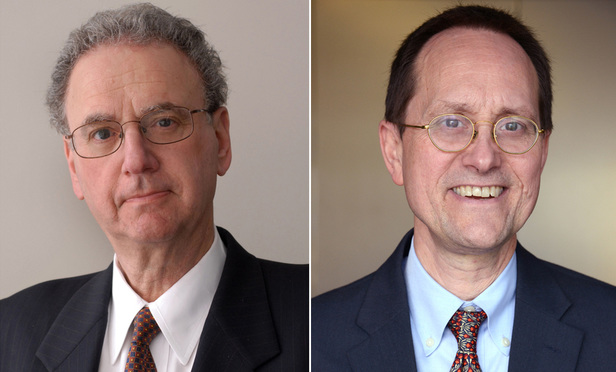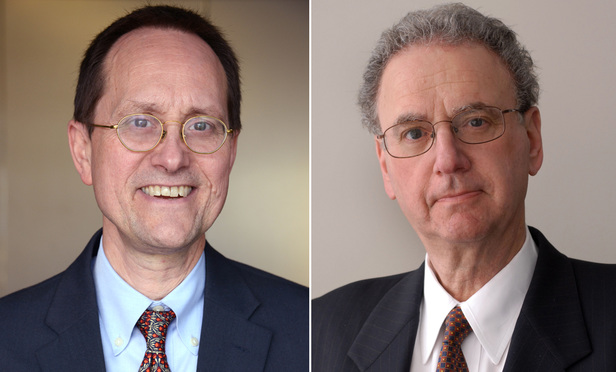Robert W. Clarida
Robert W. Clarida is a partner in the New York law firm of Reitler, Kailas & Rosenblatt LLC and the author of the treatise Copyright Law Deskbook (BNA). He is co-presenter, with Thomas Kjellberg, of “Recent Developments in Copyright,” a review of copyright decisions delivered each year at the annual meeting of the Copyright Society of the U.S.A., and is a past Trustee of the Copyright Society, a past Board member of the American Intellectual Property Law Association and former chair of the Copyright and Literary Property Committee of the Association of the Bar of the City of New York.

December 16, 2015 | New York Law Journal
Fair Use, the DMCA and the 'Dancing Baby'In their Copyright Law column, Robert J. Bernstein and Robert W. Clarida write: In a case of first impression and a victory for "dancing babies" everywhere, the Ninth Circuit recently held in 'Lenz v. Universal Music Corp.' that in order to comply with the "notice and takedown" provisions of the Digital Millennium Copyright Act, the claimant must consider the issue of fair use before serving a notice of alleged infringement.
By Robert J. Bernstein and Robert W. Clarida
10 minute read

December 16, 2015 | New York Law Journal
Fair Use, the DMCA and the 'Dancing Baby'In their Copyright Law column, Robert J. Bernstein and Robert W. Clarida write: In a case of first impression and a victory for "dancing babies" everywhere, the Ninth Circuit recently held in 'Lenz v. Universal Music Corp.' that in order to comply with the "notice and takedown" provisions of the Digital Millennium Copyright Act, the claimant must consider the issue of fair use before serving a notice of alleged infringement.
By Robert J. Bernstein and Robert W. Clarida
10 minute read

October 26, 2015 | New York Law Journal
'Authors Guild v. Google': Second Circuit Affirms Fair UseIn their Copyright Law column, Robert J. Bernstein and Robert W. Clarida write: What emerges from the circuit's thorough review of fair use is the conclusion that the research uses enabled by Google Books serve copyright's ultimate goal to advance knowledge and learning, and are circumscribed so as to avoid market harm to plaintiffs. But equally important, the court emphasized that its analysis was based strictly on its detailed exposition of the facts of record.
By Robert J. Bernstein and Robert W. Clarida
14 minute read

October 25, 2015 | New York Law Journal
'Authors Guild v. Google': Second Circuit Affirms Fair UseIn their Copyright Law column, Robert J. Bernstein and Robert W. Clarida write: What emerges from the circuit's thorough review of fair use is the conclusion that the research uses enabled by Google Books serve copyright's ultimate goal to advance knowledge and learning, and are circumscribed so as to avoid market harm to plaintiffs. But equally important, the court emphasized that its analysis was based strictly on its detailed exposition of the facts of record.
By Robert J. Bernstein and Robert W. Clarida
14 minute read

August 27, 2015 | New York Law Journal
Courts Split Over Definition of 'Cable System' for Streaming TVIn their Copyright Law column, Robert W. Clarida and Robert J. Bernstein write that after the U.S. Supreme Court dealt a devastating blow to Aereo, the streaming service unsuccessfully attempted to stave off the entry of a preliminary injunction by arguing that it should qualify as a "cable system." Last month, however, a copycat technology in California succeeded with the same argument that the Southern District had soundly and somewhat sarcastically rejected in the Aereo remand.
By Robert W. Clarida and Robert J. Bernstein
9 minute read

August 27, 2015 | New York Law Journal
Courts Split Over Definition of 'Cable System' for Streaming TVIn their Copyright Law column, Robert W. Clarida and Robert J. Bernstein write that after the U.S. Supreme Court dealt a devastating blow to Aereo, the streaming service unsuccessfully attempted to stave off the entry of a preliminary injunction by arguing that it should qualify as a "cable system." Last month, however, a copycat technology in California succeeded with the same argument that the Southern District had soundly and somewhat sarcastically rejected in the Aereo remand.
By Robert W. Clarida and Robert J. Bernstein
9 minute read

June 17, 2015 | New York Law Journal
Ninth Circuit Holds Actor Has No Copyright in Her PerformanceIn their Copyright Law column, Robert J. Bernstein and Robert W. Clarida discuss Cindy Lee Garcia's attempt to have "The Innocence of Muslims," which contains blasphemous statements dubbed over her actual words, removed from YouTube, and the Ninth Circuit's en banc holding that an actor's performance in a motion picture is not separately copyrightable, but instead is merged into the copyright for a film.
By Robert J. Bernstein and Robert W. Clarida
11 minute read

June 16, 2015 | New York Law Journal
Ninth Circuit Holds Actor Has No Copyright in Her PerformanceIn their Copyright Law column, Robert J. Bernstein and Robert W. Clarida discuss Cindy Lee Garcia's attempt to have "The Innocence of Muslims," which contains blasphemous statements dubbed over her actual words, removed from YouTube, and the Ninth Circuit's en banc holding that an actor's performance in a motion picture is not separately copyrightable, but instead is merged into the copyright for a film.
By Robert J. Bernstein and Robert W. Clarida
11 minute read

February 23, 2015 | New York Law Journal
A Sirius Question of Sound Recording RightsIn their Copyright Law column, Robert W. Clarida and Robert J. Bernstein discuss a case, potentially momentous for the music industry, over whether the holders of common-law copyrights in pre-1972 sound recordings have, as part of the bundle of rights attendant to their copyright, the right to exclusive public performance of those sound recordings.
By Robert W. Clarida and Robert J. Bernstein
11 minute read

February 22, 2015 | New York Law Journal
A Sirius Question of Sound Recording RightsIn their Copyright Law column, Robert W. Clarida and Robert J. Bernstein discuss a case, potentially momentous for the music industry, over whether the holders of common-law copyrights in pre-1972 sound recordings have, as part of the bundle of rights attendant to their copyright, the right to exclusive public performance of those sound recordings.
By Robert W. Clarida and Robert J. Bernstein
11 minute read
Trending Stories
- 1Call for Nominations: Elite Trial Lawyers 2025
- 2Senate Judiciary Dems Release Report on Supreme Court Ethics
- 3Senate Confirms Last 2 of Biden's California Judicial Nominees
- 4Morrison & Foerster Doles Out Year-End and Special Bonuses, Raises Base Compensation for Associates
- 5Tom Girardi to Surrender to Federal Authorities on Jan. 7
More from ALM
- Scan In Progress: Litigators Leverage AI to Screen Prospective Jurors 1 minute read
- Legal Speak at General Counsel Conference East 2024: Match Group's Katie Dugan & Herrick's Carol Goodman 1 minute read
- Legal Speak at General Counsel Conference East 2024: Eric Wall, Executive VP, Syllo 1 minute read



